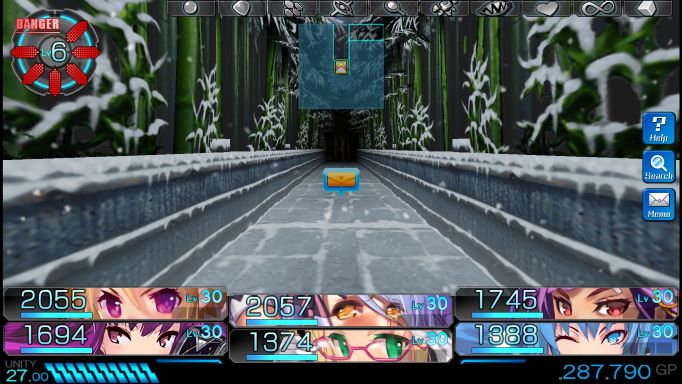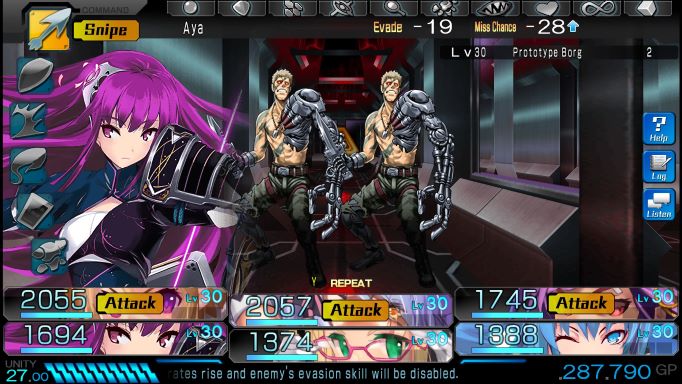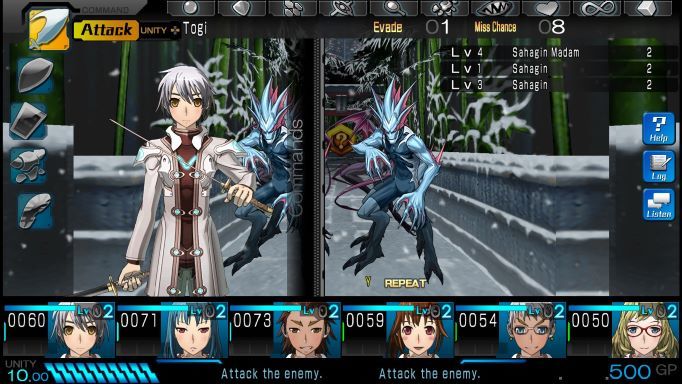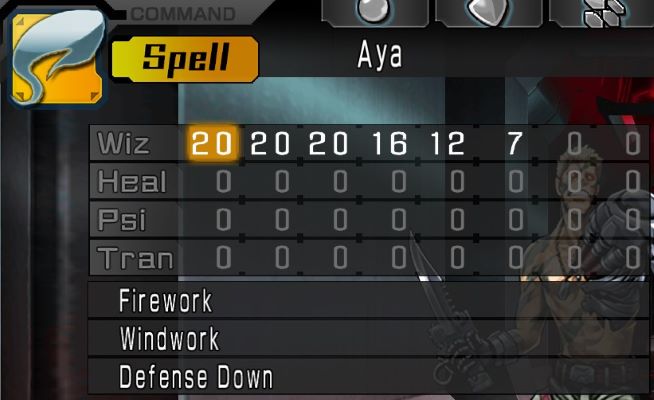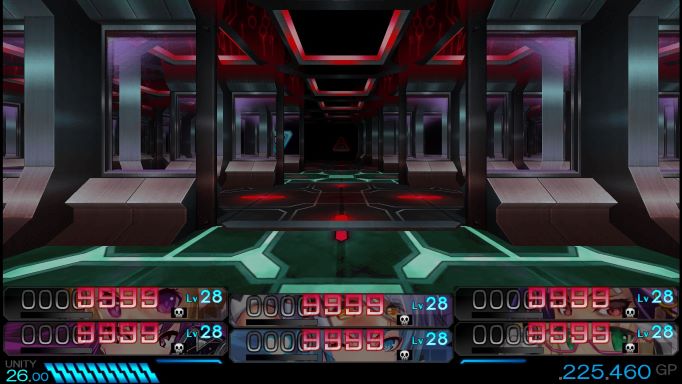2022-05-30: Operation Abyss & Babel- Wizardry, Streamlined, Anime
The First Person Grid Based Dungeon Crawler (or 'blobber' or 'gridder' depending on who you ask) probably sits as my 2nd favorite genre next to Diablolikes (for those curious, classic JRPGs would be 3rd). Despite this, I'm not a huge fan of Wizardry. Wizardry hangs its hat on being cheap and difficult for a lot of the wrong reasons in my not-so-humble opinion. However it set a foundation that a lot of games would try to build upon. Operation Abyss and Operation Babel are two such games.
These two games are a remake of an older trio (or maybe quartet? I'm not 100% clear on this) that goes by Generation Xth. Xth was a fairly rough around the edges series that came out on PC exclusively in Japan, though it did receive a fan translation. I don't know a whole lot about the original series but as I understand it, it was smashed together into two games, remade, polished up, and released globally for PC and Vita as the Operation Abyss/Babel duo.
Both series come from Experience Inc, who is likely more well known for Stranger of Sword City (gosh I need to get through that game one day). Xth was their first major project, with Sword City coming out between Xth and Operation Abyss.
Xth presents itself as a Japanese high schooler superhero near-future sci-fi story with a pretty transparent trace-over of Wizardry for its combat and mechanics. You have a party of six, two rows, Vancian magic, turn based combat, permanent field buffs, and trap filled grid-based dungeons with secret doors, shock and dispel tiles, trapped chests, and the like. They did go to some effort to change things up, but in the first few hours this is largely limited to really confusing mechanical renames.
As the story goes, your squad is all middle/high schoolers who have been identified as having latent special powers. They're recruited into a secret government society with a base under an elite private school and live double lives of student by day, superhero by night. Why kids? It's revealed that the superpowers you can manifest are the only way to fight the monsters they call Variants, and these powers disappear around the age of 20 for reasons unexplained.
As a result of all of this, you don't have a "class" as it were since you're not a trained adventurer. Instead, you can select a specific hero from history and assimilate their genetic memory via what they call a "Blood Code". This is your class, there's no difference. Since every squad member is a human student, they refitted the concept of race (Human, Elf, Dwarf, etc) into what they call a Nature (Brash, Timid, Shy, etc -- pretty much exactly like Pokemon). Honestly the nature system is pretty pointless; the stat differences turn out to be pretty moot and there's almost no gear that's nature-specific.
Character generation has you select a Nature, a Blood Code, and an avatar to represent the character. The Operation games have two modes here: a "Classic" mode that presents avatars like the original Xth games and a "Basic" mode that lets you pick a hand-drawn avatar from a panel of about 50. Classic lets you modify your avatar with the gear you equip, but the actual paper-doll is extremely basic and 'flat' feeling while the Basic characters are vibrant and stylish. However the art style on some of these is a bit... risque. There seems to be some kind of swimsuit DLC bundled in with the Steam version; not my thing but fortunately you don't have to use it.
Your mode selection also switches up the interface a bit, though it has no mechanical impact.
Basic has stylish but ultimately not very useful unit plates with the eyes of the character set in them.
Classic has more clean and direct square frames.
The story is more meaty than a typical Wizardry lift. In both games "you" are a faceless character who is in the wrong place at the wrong time and is rescued by the unplayable NPCs of the Xth squad. During the rescue they find you have "Code Rise" capability, as in the ability to manifest a Blood Code into superpowers, and you're enlisted. Once the intro is finished, you're given a squad of six mooks you can use or immediately discard to generate your own. From here, who "you" are is largely up in the air and undefined.
Your mission is to deploy to various hot zones called Abysses, where the antagonistic force has manifested and warped the geography of the land, buildings, and the like into a labyrinth where monsters called Variants roam. The primary game loop here is you deploy to a location, explore it, find a boss within and defeat it, then return to base to interact with various NPCs and pick up a new mission. Each mission ends with a discussion and more plot revelation, as opposed to the Wizardry "Go down the hole, keep going, then final boss" affair.
The characters you interact with have personality and are memorable (albeit somewhat tropey). There's actual growth and development of both the characters and the plot. Overall it reads like a really pulpy superhero student manga. The entire thing has the feelings of Persona, except none of your interpersonal activities matter at all.
The dungeons are varied and keep things somewhat fresh. There's a glut of basic buildings and sewers, but you also have woven into that cemeteries, Shinto shrines, weird otherworldly voids, strange futuristic towers, and an indoor zoo/forest. You're at least not staring at the same dungeon tileset for hours on end. Enemy types have fairly frequent palette swaps, but keep trickling in new enemy types with new abilities the entire game.
Mechanically, one of the most major differences from Wizardry is that the mandatory "Thief" slot in the party has been moved to a caster class. I applaud this, really. I never could make a thief work as anything but a really sub-optimal fighter who died often. The Academic carries all the dungeon tool benefits of the thief while also providing several massive field buffs and an arsenal of combat debuffs via the "Psi" class of magic.
Magic has four schools: Wizard, Heal, Psi, and Transform. Wizard and Heal are your classic Wizardry Mage and Cleric spells, almost carbon copied. Psi is the purview of the Academic and is largely buffs, debuffs, and a few non-elemental attack spells. Transform is the exclusive realm of Conjurers and is a weird mish-mash of spells that allow the caster to transform into a beast for a single attack, using one of the caster's stats to determine damage. Some use strength, some use wisdom, some even use luck. It's a grab-bag. I haven't done much with Conjurers.
I see very little reason to run pure mages. There's five classes of physical attacker and three front row slots, so it's pretty easy to get a combination of classes that cover the spectrum of defense piercing, group attack, and single target burst. Offensive magic is, by and large, pretty weak and you don't get all-target attack spells until the very end of the spell list. The "Quadratic mage" issue seems to not exist here, but in return mages feel almost useless. You could even almost get away without a healer, since the Monk packs a pretty powerful heal, but you'd be hurting without condition removal.
For further flexibility, you can dual class. The second class gains experience at approximately half the rate of the main, but you get all skills and spells from both while gear choices are decided by your main only. For the few things you need wizard spells for, having a mage slapped onto a back-row party member as a sub job is more than sufficient.
If anything, Operation might have added too much QoL and balancing in the favor of making melee more viable. To diversify the five physical attacker classes, they added skills. Skills are free, can be used every turn, and are just better than anything else you can do save for flinging super powerful and limited spells. The only limiting factor on skills is the really powerful ones require a turn of charging up, but the good ones pay this off in spades. A turn of charging to hit the enemy five times the next turn is very worth it, as is charging to hit every enemy in the fight. Even casters get some good skills: healers get a party-wide damage shield they should use every turn they don't need to cast. Mages get a free basic magic attack skill.
This largely reduces combat to "Set everyone to charge and unleash their big bursty skill on turn two, then hit autobattle until everything dies". To be fair, part of this is the "fault" of the autobattle system being really, really good. You can repeat actions each turn, and instantly resolve the combat instead of sitting through animations. If a skill needs to charge, it'll charge first for you. The repeat command persists across battles, so once you input your actions once, you can repeat forever. For most trash you'll be mashing Y with everyone set to attack or skill.
I feel like the devs became aware of the simplicity and triviality of combat in the ending quarter of both games as that's when they start sneaking in dirty Wizardry tricks like instant kill, ejection, dispel and shock tiles leading to invisible boss fights, and other such stuff. It definitely chafes a bit to stomp a dungeon trivially just to be ambushed by a boss on an unmarked no-magic tile that nukes you on turn one, or for the most common enemy type in a dungeon to come equipped with an instant kill they use frequently. Especially since you also do not get a resurrection until the very end of the healer spell list.
The difficulty curve overall is also really weird. When you have three spell casts per outing and no skills, combat is pretty dangerous and you'll be walking in a circle around the dungeon entrance for a few levels. Once you get rolling though, combat becomes a trivial affair until the final couple of dungeons where the tricks come out and encounter levels start jumping 5 levels per dungeon floor. It feels like you're expected to roam and grind before the final delves, but there's not really much of that to do. There's no "bonus" dungeons and you have to explore most of them to just reach the end. Grinding just ends up being setting the game's auto-walk system to walk a giant circle around the hardest dungeon floor you can survive in.
Like most Wizardry-inspired games, the Operation games also fall victim to "Wizardry did it" in a few ways. The main one is Exhaustion, Operation's version of ashing. Exhaustion can be inflicted as a status effect or, I believe anyway, applied during resurrection. Once a character is exhausted, they no longer receive bonus stats based on their level, effectively making them a level 1 character statistically. Additionally, if you make an exhausted character rest, they may decide to leave the squad, resulting in their total loss. The fix for this is to send them on vacation, which is extremely expensive and exists mainly as a gold sink. You can risk continuing to use them but there's no point. Also since the game does not autosave, if your characters gets exhausted you can just reload.
Slightly less dangerous but far more annoying than Exhaustion is Code Break. This is a mechanic introduced in Operation Babel as a major plot lever that eventually becomes a normal mechanic. Code Break is a status effect applied to a character that jams their Code Rise ability. This reduces them to a level 1 character who can attack and defend and nothing else. For a large chunk of the game you have no way to prevent or heal this condition, and when you check the plot boxes to get that ability, it's still rare and expensive to come by. Getting hit by it is basically an instant reload, short of the one time you're forced to do an entire dungeon while in Code Break-- that segment of the plot is pretty awful.
Honestly though, I'll take these over ashing and rocking.
The gear system is pretty opaque. When looking at equipment you're bombarded with arrays of letters that may not mean anything to you at first wash. There's gear equip-ability displays for every Blood Code and every Nature, gender-locked gear, level requirements, vague bonus listings (including my favorite: a ring that gave +Special Defense and +Special Defence. I guess it was big on internationalization), and obtuse elemental and type affinities rendered in strings like "ConHumInh". It all makes sense once you figure it out, but it's a lot at first. Of course this beats Wizardry and its habit of telling you absolutely nothing.
All in all it's an enjoyable romp if you like games with a lot of "turn brain off and explore and grind" to them. A lot of Operation Abyss and Babel carries itself similarly to Class of Heroes, where things are similar to and inspired by Wizardry and that means the good and the bad, but Operation tends to steer more toward the good than Class of Heroes. I'm not typically a fan of sci-fi crawlers but this duo's a pretty solid entry. It's got its warts and it's no Etrian Odyssey, but what is?
tags: operation_abyss, rpg, game_writeup
